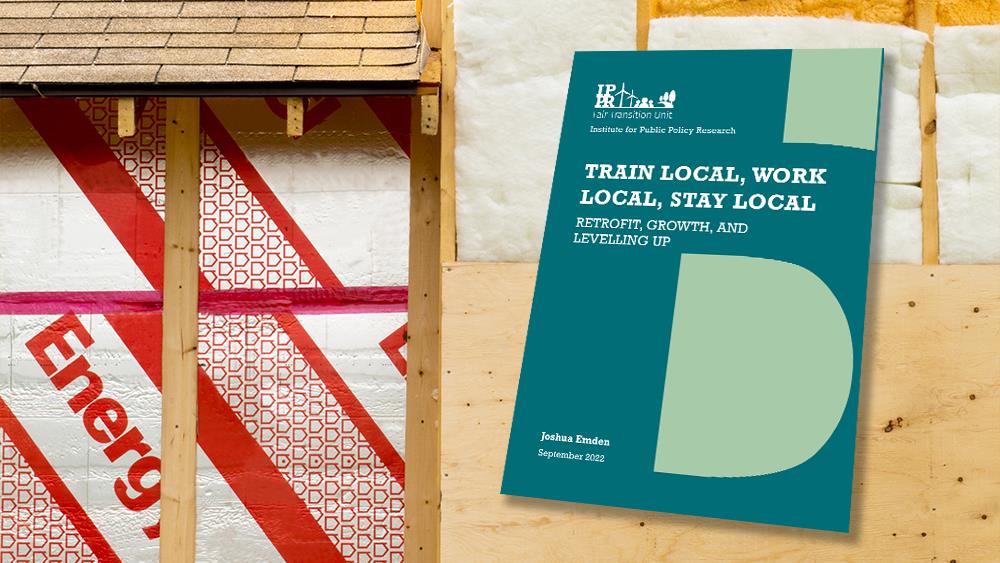

Almost all of England’s 24 million homes need to be upgraded, putting us far behind European neighbours like Germany and France. Additionally, we are currently taking less than 10% of the measures needed in our cold, damp and leaky homes, if we want to meet our net-zero target.
This means home emissions are high, people pay for it through their bills and health, and the country is overall more exposed to international crises in fuel prices.
The Institute for Public Policy Research's report, titled Train local, work local, stay local: Retrofit, growth and levelling up, lays out a 28-year plan to retrofit every household in England, which at its core would create 1.2 million direct jobs and 1.5 million indirect jobs, and provide a cornerstone for the levelling-up agenda, as well as reducing households’ bills by an average of £430 a year.
There is currently significant regional variation in employment opportunities. A retrofitting programme, at the cost of £7 billion a year, would benefit regions such as the North East and the West Midlands more than twice as much as areas like London and the South East.
The plan would create over 61,200 new direct retrofitting jobs in the North East, equivalent to more than 5% of the total job market in the region, whereas for London retrofitting jobs would represent slightly over 2% of total employment.
Coastal constituencies like Clacton, Wallasey, and South East Cornwall would benefit the most, along with former industrial centres like Doncaster North and Sheffield Hallam. It would also be particularly beneficial to so-called ‘red wall’ constituencies, like North West Durham, Birmingham Northfield, and Stoke-on-Trent North.
The report makes five key recommendations for the government to make substantial progress:
On the same day the report is released, 100 business leaders on major companies have written an open letter urging the Prime Minister to accelerate the net-zero transition to tackle the energy crisis.
Luke Murphy, Head of the Fair Transition Unit and Associate Director for the Energy, Climate, Housing and Infrastructure team at IPPR, said: “The new Prime Minister and Chancellor have said they want to focus on growth. This report shows that a national retrofit programme can deliver jobs and growth right across the country, and deliver levelling up at the same time. It would also lower energy bills, reduce energy demand and our dependence on Putin, and lessen carbon emissions.
“It’s hard to think of another intervention that could deliver on so many objectives at the same time. It’s time the government acted and invested to upgrade our nation’s homes, making them warmer and more affordable. It’s a no-brainer.”
Joshua Emden, IPPR Senior Research Fellow, said: “The UK is in the middle of the worst energy bill crisis for at least 50 years. The price cap freeze shields us from absolute catastrophe but many households are already struggling with last April’s increases. It is vital that the government takes steps to make us less vulnerable in future.
“Retrofitting will not just play a crucial part by cutting energy consumption, but also has the capacity to level-up the regions most in need.
“Over a million direct jobs, and more than a million more indirect jobs, would be created if the government pursued this retrofitting plan.
“Left-behind areas like former industrial centres and coastal communities would benefit the most from these jobs and the economic growth it will bring. The country would be better off, the economy would be better off, and the climate would be better off.”
Cllr David Renard, environment spokesperson for the Local Government Association commented: “Councils have long been calling for further investment into retrofitting homes and public buildings. Not only do poorly insulated buildings waste money for households and the public purse, but they also dampen local and national efforts to reach climate change targets.
“All households, especially those that are fuel poor need support to decrease their energy bills, and retrofitting leaky homes will do this as well as help protect more vulnerable people from suffering cold and damp conditions that can lead to ill health.
“Councils are best placed to deliver programmes to help decarbonise England’s buildings. They have the local knowledge, experience, trusted status, relationships with residents and the ability to forge local partnerships. We are keen to help the Government deliver on this win-win policy and insulate more homes.”
If you'd like to keep up-to-date with the latest developments in the heating and plumbing industry, why not subscribe to our weekly newsletters? Just click the button below and you can ensure all the latest industry news and new product information lands in your inbox every week.